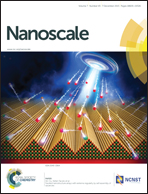Solution-based synthesis and purification of zinc tin phosphide nanowires†
Abstract
The solution-based synthesis of nanoscale earth-abundant semiconductors has the potential to unlock simple, scalable, and tunable material processes which currently constrain development of novel compounds for alternative energy devices. One such promising semiconductor is zinc tin phosphide (ZnSnP2). We report the synthesis of ZnSnP2 nanowires via a solution–liquid–solid mechanism utilizing metallic zinc and tin in decomposing trioctylphosphine (TOP). Dried films of the reaction product are purified of binary phosphide phases by annealing at 345 °C. Tin is removed using a 0.1 M nitric acid treatment leaving pure ZnSnP2 nanowires. Diffuse reflectance spectroscopy indicates ZnSnP2 has a direct bandgap energy of 1.24 eV which is optimal for solar cell applications. Using a photoelectrochemical cell, we demonstrate cathodic photocurrent generation at open circuit conditions from the ZnSnP2 nanowires upon solar simulated illumination confirming p-type conductivity.


 Please wait while we load your content...
Please wait while we load your content...